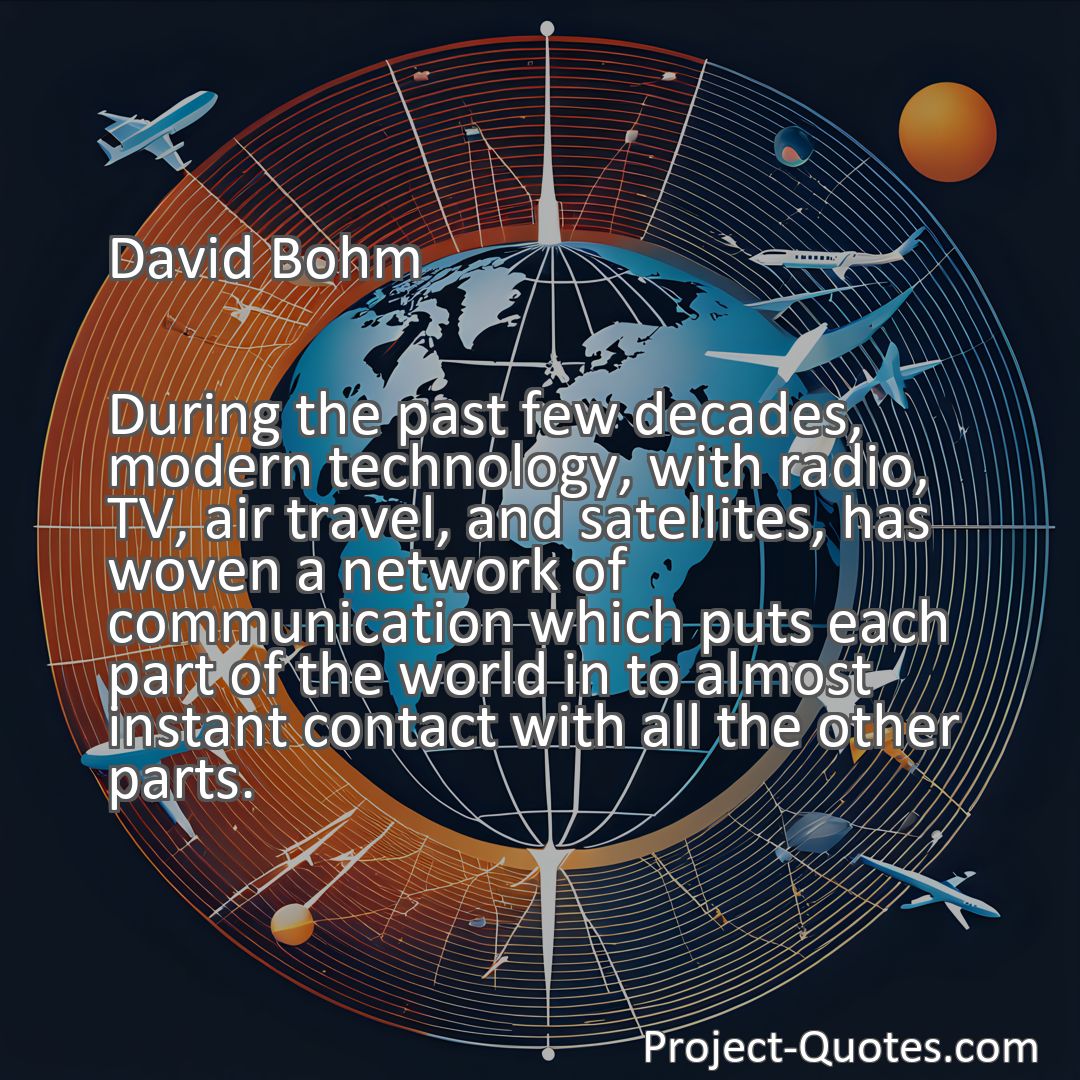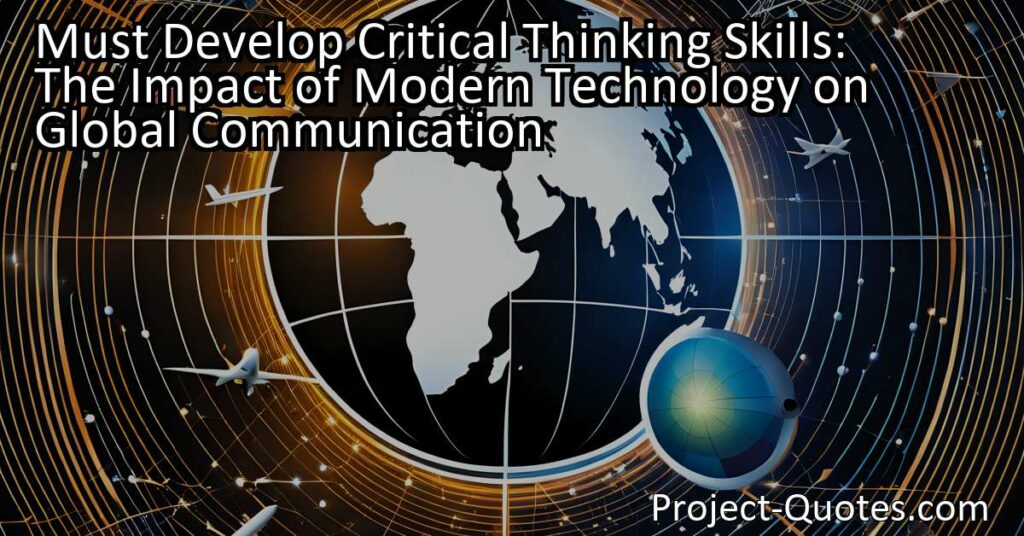During the past few decades, modern technology, with radio, TV, air travel, and satellites, has woven a network of communication which puts each part of the world in to almost instant contact with all the other parts.
David Bohm
Must Develop Critical Thinking Skills: The Impact of Modern Technology on Global Communication In today’s digital age, modern technology has revolutionized communication, allowing us to connect with people from around the world instantly. While this comes with many benefits, it is important to develop critical thinking skills to navigate this interconnected world responsibly. By discerning credible sources and promoting responsible digital citizenship, we can fully harness the power of technology to create a more connected and informed global community.
Table of Contents
- 1 During the past few decades, modern technology, with radio, TV, air travel, and satellites, has woven a network of communication which puts each part of the world in to almost instant contact with all the other parts.
- 2 David Bohm
- 3 Meaning of Quote – During the past few decades, modern technology, with radio, TV, air travel, and satellites, has woven a network of communication which puts each part of the world in to almost instant contact with all the other parts.
- 4 Freely Shareable Quote Image
- 5 Related
Meaning of Quote – During the past few decades, modern technology, with radio, TV, air travel, and satellites, has woven a network of communication which puts each part of the world in to almost instant contact with all the other parts.
In today’s digital age, where smartphones, social media, and the internet have become an integral part of our daily lives, it is evident that modern technology has revolutionized the way we communicate and connect with one another. As David Bohm astutely notes, the advancements in technology, such as radio, television, air travel, and satellites, have created a global network of communication, bridging the gaps between different parts of the world and allowing for almost instant contact between individuals who are physically miles apart.
One of the most significant contributions of modern technology to communication is the invention of radio. With radio, voices, music, and news can be transmitted over long distances, reaching people in their homes or cars. Suddenly, individuals could tune in to radio stations broadcasting from different parts of the world, breaking the barriers of time and space. The ability to listen to real-time reports of events happening in remote locations brought people together in a way never before possible. Radio became a source of shared experiences, connecting individuals on a global scale.
Television, another technological marvel, further amplified the impact of communication. With the power to transmit not just voices but also visuals, television transformed the way we consume information and entertainment. Suddenly, we could witness historical moments, breaking news, and cultural events unfold right in our living rooms. Television united people by bringing them closer to the experiences of others, fostering a sense of shared humanity.
Air travel is yet another example of how technology has revolutionized communication. It has made the world smaller and more accessible. Through air travel, individuals can hop on a plane and reach far-flung destinations in a matter of hours. This newfound mobility has expanded our horizons and opened up opportunities for global interactions. People from diverse cultures can now easily meet face-to-face, exchange ideas, and form lasting bonds. Air travel has not only facilitated personal connections but also enhanced trade, education, and cultural exchanges, further strengthening the global network of communication.
In recent years, satellites have emerged as a critical component of modern communication technology. These man-made wonders, placed in orbit around the Earth, have transformed the way we access and distribute information. Satellites enable the transmission of signals for television, radio, and internet, allowing individuals worldwide to stay connected. With the advent of satellite communication, individuals in even the most remote corners of the world can access information and connect with others, breaking down the barriers of geography and time.
The interconnectedness facilitated by modern technology has had profound impacts on various aspects of society. The ability to communicate instantly and access information has democratized knowledge, making education more accessible to people around the world. Online learning platforms, video lectures, and educational resources have revolutionized the way we teach and learn, transcending formal classroom settings. Students can now access educational materials from the best institutions and learn at their own pace, regardless of their geographical location or socio-economic background.
Furthermore, the network of communication has revolutionized global trade and commerce. Businesses can now connect with customers and partners across the globe, expanding their reach and opportunities for growth. E-commerce platforms have made it possible to buy and sell products from anywhere in the world, eliminating the confines of physical stores. This new paradigm of trade has not only fueled economic growth but also fostered cultural exchanges by making products and experiences from different parts of the world easily accessible.
While the modern technological network of communication has undoubtedly brought about numerous benefits, it is essential to recognize its potential pitfalls. It is critical to navigate this vast interconnected world with discernment and caution, as misinformation can spread just as rapidly as truthful information. The blurring of lines between fact and fiction has led to the rise of fake news, conspiracy theories, and online scams. To fully harness the power of modern technology, we must develop critical thinking skills and adopt a skeptical approach towards the information we encounter, ensuring that we rely on credible sources and promote responsible digital citizenship.
In conclusion, David Bohm’s astute observation about the network of communication created by modern technology rings true even in today’s digital age. The advent of radio, television, air travel, and satellites has revolutionized how we connect with one another, transcending the limitations of time and space. The ability to communicate instantly with individuals from different parts of the world has facilitated shared experiences, fostered cultural exchanges, and accelerated global progress. Yet, with this newfound power, it is crucial that we exercise discernment and responsibility to navigate the digital landscape wisely. By doing so, we can continue to harness the immense potential of modern technology to foster meaningful connections, bridge divides, and create a more connected world.
I hope this quote inspired image brings you hope and peace. Share it with someone who needs it today!


